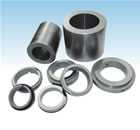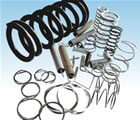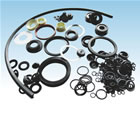Materials
The choice of seal materials depends on the type and condition of the working environment (liquid, gas, steam, temperature, pressure, oxidation capacity, etc.), features of the use of seals (reciprocating or rotary motion, travel speed), seal design features (radial-contact or face), etc.
The material must provide the necessary tightness of the connection and the specified seal durability.
Materials of mechanical seal parts
| Description | Material |
Material (detailed description) |
Material Specifications and Applications |
 Friction couples |
Carbon | carbon graphite | Low cost, good lubricating properties. Resistant to: corrosion, heating. Applicable for water and oil media, working temperature: +200℃... +350℃ |
| Ceramic |
Ceramic, Aluminum Oxide |
Resistant to: abrasion, wear. Suitable for contaminated water and lubricant | |
| SIC | Silicon carbide | Resistant to: heat, abrasion, corrosion. Used for industrial submersible, drainage pumps, etc. | |
| TC | Wolfram carbide | Resistant to: abrasion, corrosion, heat. Used for industrial submersible, drainage pumps, etc. | |
|
|
|||
|
|
NBR | Acrylic Nitrile Butadiene Rubber | Resistant to: lubricants, liquid fuels: gasoline, diesel fuel and oil. Applicable for water and lubricant. TEMPERATURE RANGE : -30 °C to +40 °C, short-term up to +60 °C |
| EPDM | Ethylene propylene rubber |
Resistant to: heat, freezing, chemicals.
TEMPERATURE RANGE : -50°C to +120°C |
|
| Viton | Fluoroelastomer | Resistant to: heat, lubricants, chemicals, beer, milk, acetone. It is applied to the hydraulic equipment working at elevated temperature. TEMPERATURE RANGE : -20°C to +120°C, short-term - up to +150°C | |
 Compression springs |
SS304 |
Steel Grade SUS 304 | Steel corrosion-resistant ordinary X5CrNI18-10. |
| SS316 | Steel Grade SUS 316 | Stainless steel. Steel increased corrosion-resistant ordinary X5CrNiMo17-12-2. | |



